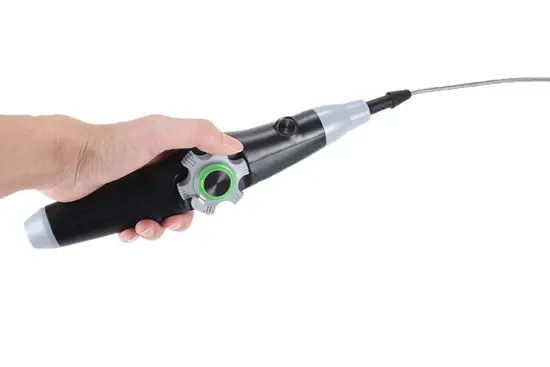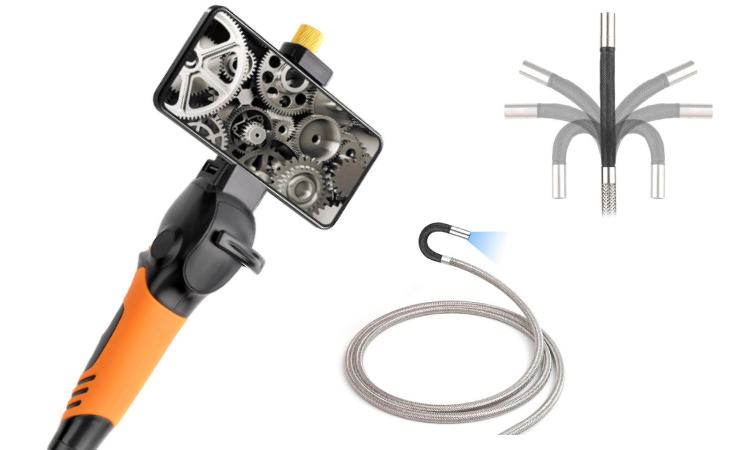Boroscope are remote visual inspection devices that transmit images back to an ocular or screen via rigid or flexible tubes. An industrial video borescope camera is used to see in walls, inspect pipes and see inside engines. Inspectors use this to examine areas that are difficult to access.
Types of Video Borescope Cameras
Video borescope cameras are essential tools for remote inspection in several industries, and they are adapted to a variety of uses based on their type. These different types of video Engine borescope cameras are highlighted below.

| Rigid | Semi Rigid | Fiberscope | Videoscope |
|---|---|---|---|
| The oldest boroscope and was initially used in the defense industry to inspect barrels. | Have more flexibility than rigid ones. However, they seem to have limited video quality. | Made from fiberglass to transfer signals, including video signals, very effectively using thin and flexible cables. | The most preferred of the video borescope cameras. It is a heavy improvement on the fiberscope. More flexibility and high video quality. |
| Typically suitable for straight-line component inspection where no complex geometrical parts are involved. | Offer high durability compared to other borescope cameras. | More flexibility added to its high video quality. Requires a lot of care since it is irreparable once it begins to crack. | Last longer as they come packed with more durability than a fiberscope. |
Rigid
Rigid video borescope camera is the oldest and was initially used in the defense industry to inspect barrels. Direct internal remote inspection is usually their forte, and they are typically suitable for straight-line component inspection where no complex geometrical parts are involved.
Semi-rigid
This type of video borescope camera has more flexibility than rigid ones. However, they seem to have limited video quality, which is why some inspectors and industries often prefer other types. Yet, they offer high durability compared to other borescope cameras.
Fiberscope
Made from fiberglass to transfer signals, including video signals, very effectively using thin and flexible cables. Fiberscope came with more flexibility added to its high video quality. However, it requires a lot of care since it is irreparable once it begins to crack.
Videoscope
After a heavy improvement on the fiberscope, the videoscope was born. This borescope camera had even more flexibility and high video quality. What’s more, they last longer as they come packed with more durability than a fiberscope. These qualities make the videoscope the most preferred of the video borescope cameras among inspectors and quality assessment professionals.
What Industries Use Industrial Video Borescope?
The industrial video borescope is a very versatile NDT Testing Equipment used in various industries, some of which are highlighted below.
Aerospace industry
This is a highly regulated industry with different equipment and components that require high precision and accuracy during an inspection. Hence, the aerospace industry often uses industrial video borescopes extensively for its parts and components to ensure that they meet high safety requirements.
Oil and gas industry
This industry often integrates complex parts and components into its processes and facilities. As such, a tool with high maneuverability and the ability to adapt to irregular shapes is often a requirement. The industrial video borescope is often the device of choice for these complex inspections and examinations, which ensures that facilities like refineries and processing plants work efficiently.
Automotive industry
Parts like castings and electronic sensors often used extensively in this industry require specific inspection processes to meet the high-quality requirement of the industry. Also, operations like welding often require a very accurate inspection tool to ascertain the quality of this operation, especially for internal welds of tubes and bores. Industrial video borescopes often appropriately fit into this industry inspection plan to carry out these quality assessments.
6 Benefits of Buying an Industrial Video Borescope
- Applicable to different inspection usages
An essential benefit of an industrial video borescope is its ability to serve different inspection purposes for different components, making it applicable to many inspection possibilities. Different industries use it for inspecting a wide array of equipment with different use cases, including debris within a gas turbine and complex electronic devices.
- Measure accurately
Certain parts and equipment components will require a high degree of inspection accuracy for industries requiring a high level of precision, such as the automotive and aviation industries. For instance, some openings and tubes have very tiny diameters and require inspection tools with very small diameters. Industrial video borescopes have cameras with tiny diameters as small as 12.5mm that can accurately do the measurement.
- Maximize efficiency
Assembling specific equipment and components often requires great precision and a significant amount of time. Hence, maintenance or repair works on these parts often require a significant amount of time, energy, and resources which usually reduces the efficiency of the production process. Thankfully, an industrial video borescope helps to maximize efficiency as they don’t require the removal of any part before carrying out the necessary inspection.
- Target the dark inspection area easily
The integration of LED light sources in an industrial video borescope means you don’t have to strain your eyes while inspecting dingy and hidden corners within equipment or components. An industrial video borescope is beneficial for accurately inspecting areas with low lighting and visibility.
- Keep you connected
Some manufacturing equipment uses automation and has to be connected wirelessly over a network. However, maintenance works may require a total tear-down of the equipment to carry out diagnosis or repairs and often require that this equipment be disconnected. Fortunately, with an industrial video borescope, such tear-down is often avoided keeping the equipment connected and easily accessing the required area.
- Reduce equipment downtime
Employing an industrial video borescope’s tiny camera helps you avoid equipment downtime since it can detect anomalies in hard-to-reach corners of equipment like debris within a gas turbine. This type of inspection typically requires the total dismantling of the equipment, which can take significant time to analyze and assemble.





